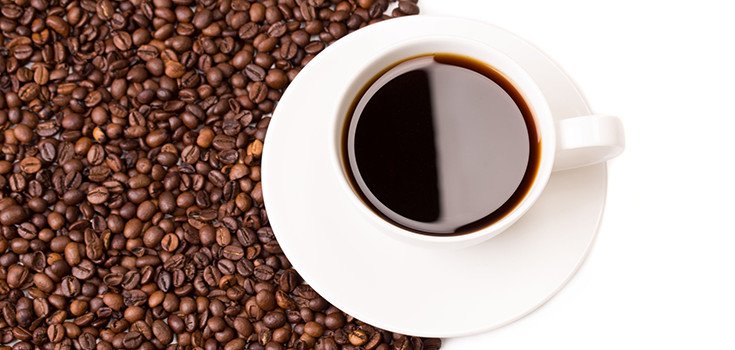Heavy Coffee Drinking Linked to Improved Colon Cancer Survival Rates

Heavy coffee drinkers are far more likely to survive colon cancer than those don’t drink coffee, a new study concluded.
Significant benefits were found to begin at two to three cups per day. Colon cancer patients who drank four or more cups of caffeinated coffee per day had half the rate of recurrence or death than non-coffee drinkers. [1]
The study abstract concludes:
“Higher coffee intake may be associated with significantly reduced cancer recurrence and death in patients with stage III colon cancer.”
The researchers warn, however, that people with colon cancer should not suddenly start drinking large amounts of coffee. The study does not prove a cause-and-effect relationship between consuming coffee and a lower risk of colon cancer recurrence. It’s possible that the research was unable to account for certain differences between heavy coffee drinkers and those who don’t drink the beverage at all.
Dr. Alfred Neugut, a professor of cancer research, medicine and epidemiology at Columbia University and a director of New York-Presbyterian Hospital’s Cancer Prevention Center says:
“Think about it: People who drink a lot of coffee tend to be high stress, high pressure, intense and compulsive. If they have cancer, they’re going to be more obsessive about following all the rules and doing all the things they’re supposed to do. So it may be that coffee itself is playing a physiological role, but it may also be a surrogate marker for you being a compulsive health-conscious good behaver.”
Read: Can Coffee Really Reduce the Risk of Deadly Skin Cancer?
Dr. Charles S. Fuchs, the director of the Gastrointestinal Cancer Center at Dana-Farber Cancer Institute in Boston, who led the research, said that a study of this kind has never been conducted on colon cancer patients. Fuchs acknowledged the study’s limitations and called for interventional studies to duplicate and confirm the researchers’ findings.
For the study, published Aug. 17 in The Journal of Clinical Oncology, researchers followed 953 patients with Stage 3 colon cancer who had been treated with surgery and chemotherapy. The participants were asked to fill out a questionnaire regarding food intake and lifestyle, first during chemotherapy and again six months later. The questions were specific to their intake of caffeinated or decaffeinated coffee, herbal and non-herbal tea, caffeinated soft drinks and chocolate.
The scientists adjusted the findings to control for gender, age, smoking, diet, caloric intake, consumption of sugar-sweetened beverages and alcohol, weight, physical activity and other differences. The researchers did not, however, adjust for aspirin and other NSAID drugs, despite earlier research that suggested the painkillers may protect colon cancer patients from recurrences of the disease. Fuchs said the team’s previous research did not show any association between coffee drinking and aspirin use.
It was determined that patients who drank four or more cups a day of caffeinated coffee were 52% less likely to have had a recurrence of colon cancer or to have died from the disease than those who had never drank coffee. Those who drank two to three cups of caffeinated coffee a day were found to be 31% less likely than non-drinkers to have had a recurrence or to have died, Sweetened coffee beverages did not count.
The researchers hypothesize that the risk factors that increase risk for Type 2 diabetes, such as obesity, a sedentary lifestyle and high insulin levels, are also contributing factors to colon cancer. Coffee consumption has been linked to lower risk for Type 2 diabetes in numerous studies.
“We believe that activating the energy pathways that contribute to heart disease and diabetes is also relevant for the proliferation of cancer cells,” Dr. Fuchs said, while also stressing that more research was needed.
The analysis determined that caffeine was the primary reason for the lower risk of colon cancer recurrence or death. The scientists believe that caffeine increases the body’s sensitivity to insulin, so it requires less of the hormone, which may result in reduced inflammation – a risk factor for diabetes and cancer.
Sources:

Don’t forget coffees has acids in them, too. It can cause bone to lose calcium. I just wonder these coffee companies are paying doctors to promote coffees that is good for you? Hmmm….
Yes…….but if you cold brew the coffee it can be up 70% less acidic….yay! I have read many articles for the past 10 years on this subject. The first one I ever read was one related to coffee and tea reducing the chances of diabetes. An I know many people to coffee enema’s for colon health. I am a believer 😉